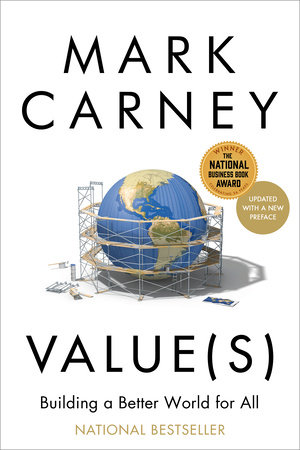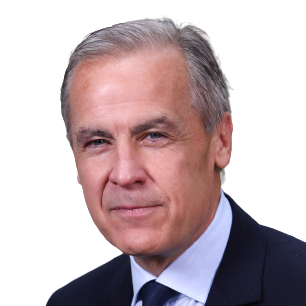Bankers and Values are not words commonly associated, at least not in a complimentary way, nor would banking or the current skewed financial sector be the place one would automatically turn to for answers to building a better world for all.
Having attended several of his talks, if anyone can redress this perception it is Mark Carney, a long-standing friend of the WCCM, who knows the financial world intimately, straddling both private and public sectors, firstly at Goldman Sachs, then as deputy Minister in the Canadian Finance department before becoming Governor of the Central Bank of Canada and until 2020, Governor of the Bank of England. Additionally, Mark was Chair of the Financial Stability Board for seven years, so knows a thing or two about the strengths and weaknesses of the system and what reforms are needed to create a more stable and equitable global financial system.
Building a Better World for All

Written during a rare contemplative break of ‘garden leave’ at the end of his seven-year London tenure, he reflects on the causes of the major global crises he has observed first-hand; credit, Covid and the climate crisis, and makes a compelling argument for using a values-based approach to channelling the energy of the market to build more inclusive, resilient and sustainable societies.
He posits that the way the global economy conceptualizes value has been standing in the way of achieving this. Highlighting that values and value are related but distinct and that values underpin value; he firmly holds the view that we can rebuild the social capital and moral ground that will enable shared prosperity for the greater common good. I am including his definitions here in full as they are core to his reasoning:
‘In the most general terms, values represent the principles or standards of behaviour; they are judgements of what is important in life.’
Examples include integrity, fairness, kindness, excellence, sustainability, passion and reason. Value is the regard that something is held to deserve – the importance, worth or usefulness of something.
Both value and values are judgements. And therein lies the rub’.Mark Carney
Turn the markets back into humanity
Mark recounts the delightful story that prompted this book; being challenged at a luncheon at the Vatican along with others in a parable -like way by Pope Francis to turn self-interested markets back into humanity. Noting that their meal would be accompanied by wine, His Holiness observed that wine is many things – it has bouquet, colour and richness of taste that all complement the food and alcohol that can enliven the mind. Wine enriches all our senses. Contrasting that with grappa– he noted grappa is one thing: alcohol, wine distilled. He drew the parallel with humanity as many things – passionate, curious, rational, altruistic, creative, self-interested but noted that the market is one thing; self -interested. The market is humanity distilled. Then he threw down the gauntlet; Turn the grappa back to wine. Turn the markets back into humanity.
How to do this is the golden thread running through the 500 complex, well researched pages, sprinkled with anecdotes and behind scenes conversations that make high level meetings more relatable. Value(s) begins with an historical exploration of the theories of value and ends with a chapter on humility. The last chapter is a clue to what makes this book different. Yes, this is a fascinating and invaluable global economic commentary that will likely become a prescribed textbook for many students especially social and behavioural economists, but it is much more. Mark is a meditator-he says especially if he is particularly busy (I loved that comment) and it shows.
Silence awakens consciousness and deepens humility teaches Fr Laurence and it connects us to one another and the earth that sustains us. This is something Mark has clearly taken to heart as one senses a deeply rooted compassion and connectedness born from a contemplative practice. His observations and the recommendations are grounded in the knowledge that those who have power also have a responsibility to be in service to others and that all are, in his words ‘equal within’. Mark moves in lofty circles and the hope is that Value(s) is read by his peers, by decision makers who embrace these suggestions, and it arouses the change we urgently need and deserve.

It is also a worthy read for anyone finding the multiple crises, social and economic injustices we see all around us overwhelming and challenged to navigate a path that is compatible with the values contemplative practice cultivates. I am writing this at a time three banks have collapsed in quick succession. Until recently it was considered unthinkable that a Swiss bastion of banking would fail, but fail it did, fuelling further public distrust of a system that despite a more resilient post-crash financial system, is still perceived to be self-serving, where the gap between rich and poor continues to widen, risks from climate change are largely unaccounted for and swathes of society are feeling marginalized.
A world where multilateralism and democratic accountability is in decline along with the rules-based architecture on which so many institutions and nations rely. It’s reassuring that Mark tackles these head on, with a good proportion of the book devoted to solutions ranging from the local to global, suggestions for individual, corporate and country actions that are not naive, nor anti market, but implementable based on what he has seen work and deep analysis of what has failed.
The three lies of finance
Some of the failure is down to what he calls the three lies of finance; believing markets are always right, markets are moral, and this time will be different. Added to this are markets estranged from society, unaccountable and that negatively influence the values of society instead of bolstering societal wellbeing. Oscar Wilde’s criticism that ‘people know the price of everything but the value of nothing’ has become the malaise where markets undervalue what matters to people. Yet markets are social constructs which presupposes they can be remade.
Determining a list of the values and beliefs that will underpin this remodelling must have involved some interesting and probably contentious conversations around the Carney dinner table! Dynamism, sustainability, effectiveness, fairness and trust, responsibility, accountability and a sense of solidarity triumphed. Not a fixed list but muscles needing, like meditation, to be exercised to be beneficial. He acknowledges that real human progress needs moral progress and moral progress requires not only values but virtues, prime among them the theological virtues of justice, wisdom, courage and charity. Essentially these are absolutes and elements of character, so it is in the chapters on cultivating leadership and the evolution of his own journey where Mark shows his more radical side.

Placing importance on meditation to provide clarity of mind and the letting go of power over others to use it in service of others, he values self-knowledge as a means to cultivate solidarity, build community. Equally heartening, describing how misunderstandings pile up when, like most of us, he gets too busy to meditate – a spur to make the time.
It is often said that meditation generates time elasticity. This must be true given that in addition to a full professional and family life, Mark also has the role of UN Special Envoy for Climate Action and Finance, possibly his most important role to date. I read this chapter avidly given my work in this field and knowing how influential Mark has been in raising the alarm on the risk climate change poses not only to the stability of financial systems but to humanity and the decisive actions he took whilst Governor of the Bank of England to require climate risk disclosure and mitigating actions by financial institutions. Despite all these efforts and the Paris Agreement of 2015, carbon emissions have never been as high and the impacts on our interdependent global ecosystem are being seen daily on our TV screens.
As Mark says; ‘what had been biblical is now commonplace’. The planetary systems that sustain life and maintain global stability such as the Oceans, the Atmosphere, the Poles and the Forests, collectively recognised as Global Commons, are facing tipping points into dangerous feedback loops and cascades of harm that will be increasingly difficult and very costly to recover from. Charting conservative estimates of foregoing 15-30% of global GDP along with a significant decline in animal, birds, fish and reptiles in the time since he was born, he rightfully calls this the tragedy of the horizon.
A failure to value what nurtures wellbeing
The roots are the same, failure to value what nurtures wellbeing, but in this case, it is humanity’s biggest challenge yet as what is lost is likely to stay lost. Few people understand systemic risk as well as Mark does and the importance of timely interventions. He again calls for decisive, ambitious and measurable policies and incentives for well-directed market power to drive innovation, investment and purposeful profit. This requires leadership that sets eyes on the horizon yet also sees from the periphery, exercising climate justice and protecting the most vulnerable and future generations.
In an early chapter Mark slips in that value is an illusion (which could be the focus of another book) and he fittingly concludes with natural humility that any sense of permanence to his many achievements is also illusory as ultimately many achievements are down to chance, and to Grace.
This a commanding book. A meaty read and I found myself rereading many chapters because there is so much wisdom distilled grappa like in these 500 plus pages. I was left with a profound sense of humility at just how precarious we have allowed things to become, yet also hope. Hopeful that we have the humility to change and discard what no longer serves us. Hope that we have a shot for the journey to be more like Schumpeter’s “gale of creative destruction” and not an indiscriminate slow-moving hurricane if we follow the wisdom path charted here with values as the lodestar.
Will leaders grasp its message? Nature will most likely leave us no choice.
Mark Carney will hold an online talk on economics and its role in shaping our future as part of the 2023 WCCM series, Metanoia “Let your minds be remade”.
Book cover by Penguin Random House Canada





5 thoughts on “Value(s) – Building a better world for all”
Very nice. Interesting, that a man with his values, actually had power. In Brazil, he would have been an outcast! He would have been destroyed!
Thank you Inge for a very informative review of Mark’s book. I pray that it will not only be popular but read with an open heart by politicians and business leaders and most of all they too will be transformed by taking the inward silent path of meditation.
This was written 2 years ago, and today we see little improvement in the behaviour of many leaders and Boards. The failure of 3 banks recently, as noted by Inga above, being testament to many not “getting” sustainability.
I love the challenge put out by Pope Francis. I wish more people know of that challenge and pick it up for themselves.
The Behaviour and values framework distilled by Inge in her summary, further listed below –
– Integrity,
– Fairness,
– Kindness,
– Excellence,
– Sustainability,
– Passion,
– Reason,
– Dynamism
– Effectiveness
– Trust
– Responsibility
– Accountability
– Solidarity
Meditate, be in the moment, reflect, are all actions that underpin – “doing the right thing”, and we have to learn to act this way, always.
Mediation enables us to discover the virtues or fruit of the Spirit within us – and talk of values is ‘false’ without taking the journey of meditation to discover the goodness within – I recently read this quote from Aquinas which shows the virtues as essential to meditation….
“A thing may belong to the contemplative life in two ways, essentially or as a predisposition…. The moral virtues belong to the contemplative life as a predisposition. For the act of contemplation, in which the contemplative life essentially consists, is hindered both by the impetuosity of the passions and by outward disturbances. Now the moral virtues curb the impetuosity of the passions and quell the disturbance of outward occupations. Hence moral virtues belong to the contemplative life as a predisposition.St. Thomas Aquinas”
Excerpt from
The Perennial Philosophy (P.S.)
Aldous Huxley
One of the most important things from the review that makes me want to read the book is its coverage of the ongoing struggle between what we know must happen, and our uncertainty about how to do them on a grand scale. It is helpful to have reflections from people who have been at the center of the systems struggling to change that reflect an important degree of humility. Across many fields, but particularly in finance, we’ve seen over and over the excessive hubris that pushes us to the brink. And it is so well expressed to call the three lies of finance (“believing markets are always right, markets are moral, and this time will be different”) without at the same time succumbing to fatalism that these human-created systems can never be shifted in the right direction. And to quote a mentor throughout my career, “there’s much to do, and not a moment to lose!”